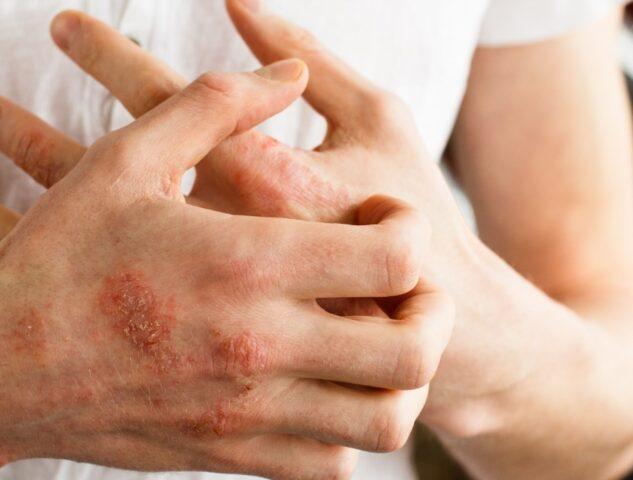Content
Allergy to persimmon is not observed very often. It can occur in both children and adults at almost any age. The most characteristic symptoms are associated with the skin (itching, redness, rash, and others). In rare cases, dangerous conditions are observed - Quincke's edema and anaphylactic shock. They require emergency medical attention.
Can you be allergic to persimmons?
Allergy to persimmon occurs in rare cases. It is due to the fact that the fruit pulp contains at least three allergen proteins that cause redness, swelling, rash, and disorders of the respiratory, digestive and other systems.
An allergy to persimmon can also be a cross reaction, when the consequences are associated with the same components. To establish the exact cause, it is necessary to conduct special tests in a clinical laboratory (allergy tests).
The main ones include alcohol abuse, smoking, general deterioration of immunity, as well as long-term use of certain medications.
Causes of persimmon allergies
Allergy to persimmon is quite rare. It is associated with the individual characteristics of the body, when a particular person has increased sensitivity to a particular component. Research has revealed that persimmon contains three allergens:
- Diok4 is an actin-binding type profilin protein.
- 17 kDA – protein similar in composition and functions to Bet v
- A protein similar to Bet v 6 slows down the action of pectin group methylesterase (a special enzyme).
Also, an allergy to persimmon can occur due to the iodine and minerals it contains. Adverse reactions of the body can occur at any age in both children and adults. Similar manifestations can be observed even in newborns, since they receive allergens along with mother's milk.
Symptoms of persimmon allergy
Manifestations of persimmon allergy are varied. They can be associated not only with skin reactions, but also with other organ systems. So, the following symptoms are often observed from the digestive system:
- A red stripe on the lips, in the corners of the mouth, paleness of the integument, transverse cracks are signs of cheilitis.
- Inflammation of the mucous membrane in the intestines and stomach - colitis, gastritis.
- Gastroenteritis is an inflammatory process that occurs in two organs at once. The stomach and small intestine suffer.
- Irritable bowel syndrome – abdominal pain, bloating, diarrhea or constipation.

Most often, allergic reactions appear on the skin
On the part of the respiratory system, an allergy to persimmon gives the following consequences:
- Rhinitis - itching in the nose, palate or nasopharynx, poor sense of smell, sneezing.
- Feeling of stuffiness.
- Redness of the mucous membranes of the eyes.
The most common allergic skin reactions are:
- atopic dermatitis;
- hives (red or pink blisters, severe itching);
- Quincke's edema (general swelling of the skin and mucous membranes);
- anaphylactic shock (fever, headaches, panic, jump in blood pressure, inability to control bowel movements, urination, nausea, vomiting, difficulty breathing).
How to recognize a persimmon allergy
It is not always possible to determine at home the fact that persimmon caused an allergy. The fact is that the symptoms described may be associated with other reasons. For example, nausea, diarrhea, and vomiting are caused by food poisoning. And bronchial asthma can also be observed as a reaction to pollen, dust, and even nervous stress.
Therefore, doctors and nutritionists recommend keeping a food diary in which to track the body's reactions to different foods. This is especially important for patients with unusual reactions to various stimuli.
The fact of an allergy can be detected by skin manifestations:
- itching;
- rash;
- redness;
- swelling.
Recognizing an allergic reaction to persimmons must take into account the age characteristics of the person. Thus, in newborn children, symptoms are most often associated with constipation and colic. Main features:
- peeling;
- itching (traces of scratching on the skin);
- redness;
- rash;
- restless behavior;
- frequent crying for no apparent reason.
In older children, reactions are as follows:
- rash;
- itching;
- abdominal pain;
- bloating, flatulence;
- diarrhea;
- cardiopalmus;
- nausea and vomiting.

Eating persimmons can cause negative effects on the digestive system.
As for adults, their allergies most often manifest themselves as reactions from the gastrointestinal tract:
- nausea;
- urge to vomit;
- gas in the stomach (flatulence);
- diarrhea;
- abdominal pain, discomfort.
Next, you need to sequentially eliminate other products. For example, one day you can eat only persimmons and wait a few hours. If the body gives the appropriate reaction, it means that the allergy is associated with this particular fruit.
It is worth considering that only a doctor can make an accurate diagnosis. For examination, you need to contact an allergist. He will conduct a series of tests, after which it will become clear what exactly the body’s immune system reacts to when recognizing a particular product as an allergen. The reaction may be related to persimmons or other foods.
It is necessary to consult a doctor as soon as possible and follow his recommendations.
Who is at risk
From the point of view of persimmon allergies, several categories can be classified into risk groups:
- newborns up to the fifth month of life;
- allergy sufferers;
- people who had relatives with fruit intolerance (a hereditary predisposition is possible);
- abusing alcohol, smoking;
- persons with weakened immunity due to diseases and/or poor lifestyle;
- patients taking certain medications for a long time, for example, hormonal drugs.
Allergy treatment
The first aid for an allergy to persimmon is to take antihistamines, for example:
- "Suprastin";
- "Diazolin";
- "Tavegil";
- "Diphenhydramine";
- "Fenkarol" and others.

Suprastin or other antihistamines are given as first aid for allergies.
The doctor may also prescribe the following medications:
- sorbents;
- anti-inflammatory drugs;
- anti-vomiting medications;
- antidiarrhea medications;
- laxatives.
In severe forms, for example, angioedema, treatment with hormonal drugs, which are available only by prescription, is indicated. If anaphylactic shock occurs, the emergency physician may give an emergency injection of epinephrine.
Consequences
In most cases, allergies to persimmons and other foods and medications do not cause too dangerous consequences. But sometimes the body's reactions can be too strong. If you consume fruit in large quantities for a long time and do not pay attention to your deteriorating health, the following consequences may occur:
- swelling of the skin;
- rhinitis (can become chronic);
- constipation;
- diarrhea;
- indigestion.
- tingling sensation in the mouth;
- swelling of the lips, tongue, throat or entire face;
- conjunctivitis;
- general weakening of the immune system;
- loss of strength, fatigue.
These conditions require immediate medical attention. Therefore, you should call an ambulance as quickly as possible.
Precautionary rules
Negative consequences can be observed not only among allergy sufferers, but also with excessive consumption of persimmon. To avoid allergic reactions, especially in children, it is recommended to take certain precautions:
- Never eat fruit, especially unripe fruit, on an empty stomach.This will lead to digestive disorders, abdominal pain and even constipation.
- Do not consume more than three fruits per day (the maximum daily amount for an adult is 500 g in terms of pure pulp).
- Avoid simultaneous consumption of fruit and milk, any dairy and fermented milk products.
- Use with caution during pregnancy in quantities of no more than two fruits per day and only on a full stomach.
- During breastfeeding, introduce persimmons into the diet only from 4-5 months of the child’s life. You need to start using it with minimal quantities, for example, 30-50 g of pulp. It is necessary to monitor the child’s condition for three days. If he has normal stool, no itching, redness, rash or other signs of allergy, gradually increase the amount of fruit.

A nursing mother can eat no more than two fruits per day
Conclusion
Allergy to persimmon is a relatively rare phenomenon, since the fruit is generally safe for the health of children and adults. However, adverse reactions are not excluded, and they can occur not only on the skin, but also on the digestive and respiratory systems. Therefore, it is better to start consuming persimmons with small quantities - this is especially important for nursing mothers.








